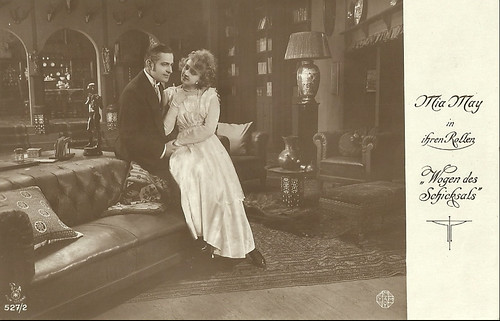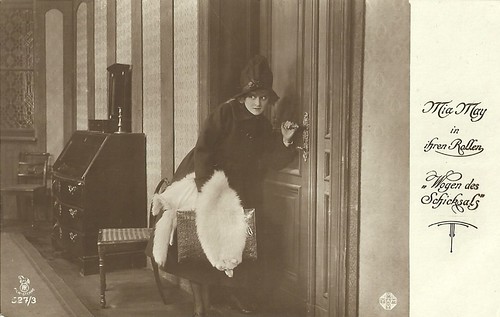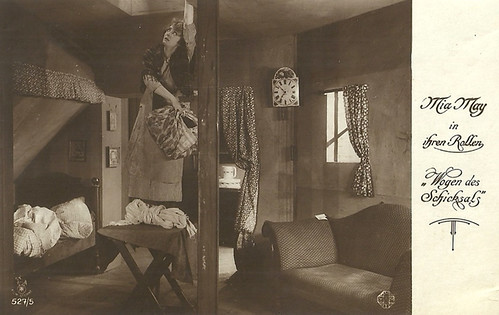German silent film diva Mia May was the star of Wogen des Schicksals/Waves of fate (1918). Her husband Joe May was the producer, writer and director of the melodrama. Rotophot published the sepia postcards of the film in their Film Sterne series.

German postcard by Rotophot in the Film Sterne series, no. 527/1. Photo: May Film. Mia May in Wogen des Schicksals (Joe May, 1918). The man on the dance floor signing to her is Erich Kaiser-Titz, while the man sitting next to Mia May is Rolf Brunner.
Bank director Von Letzow (Erich Kaiser-Titz) meets in an antique shop Vera von Bergen (Mia May) who wears a medallion of a noble lady, her mother.
She tells him how, after the death of her mother, her stepmother together with her brother, who became Vera's warden after her father died too, turned Vera's life into a nightmare. They sent her to boarding school and made her flee to her only friend, her former nurse and now a poor grocery shop lady.
Letzow offers to marry her so she can repossess her castle and chase the intruders. He also promises to divorce her when necessary, so she can marry her love Alfred, who is in the US.
In the castle, Vera discovers a bottle of 'medicine' which she suspects to be the poison the stepmother used to kill off Vera's father. Letzow finds out this is truly so.
When Alfred comes back penniless from the US he proves to be an unreliable gambler, so Vera's eyes are opened and she stays with Letzow.

German postcard by Rotophot in the Film Sterne series, no. 527/2 Photo: May Film. Mia May and Erich Kaiser-Titz in Wogen des Schicksals (Joe May, 1918).

German postcard by Rotophot in the Film Sterne series, no. 527/3. Photo: May Film. Mia May in Wogen des Schicksals (Joe May, 1918).
Wogen des Schicksals/Waves of fate was filmed in early 1918 and premiered in March that year.
Neue Kino-Rundschau wrote on 29 June 1918 about Wogen des Schicksals: "A film that appeals to the taste of the big audience! It contains a series of strong conflicts, a good portion of excitement, and finally a happily united loving couple.
It is also brilliantly and effectively staged, as the name Joe May vouches for. (...) Mia May ... holds the female lead, which embodies her full of charm and grace.
Erich Kaiser-Titz is her partner, whose noble calm and gentle pantomime always captivates and delights. Finally, the photography must also be mentioned, as it is simply exemplary."
While sometimes direction is attributed to Leopold Bauer, most designate Joe May as both the scriptwriter and director of the film. Cinematographer was Curt Courant.
Wikipedia suggests Frieda Richard and Hermann Vallentin played the stepmother and her brother, and Rolf Brunner Alfred, but no hard proof about their casting is available.

German postcard by Rotophot in the Film Sterne series, no. 527/4 Photo: May Film. Mia May and Georg John in Wogen des Schicksals (Joe May, 1918).

German postcard by Rotophot in the Film Sterne series, no. 527/5. Photo: May Film. Mia May in Wogen des Schicksals (Joe May, 1918).
Sources: Filmportal.de, Wikipedia (German) and IMDb.

German postcard by Rotophot in the Film Sterne series, no. 527/1. Photo: May Film. Mia May in Wogen des Schicksals (Joe May, 1918). The man on the dance floor signing to her is Erich Kaiser-Titz, while the man sitting next to Mia May is Rolf Brunner.
Life as a Nightmare
Bank director Von Letzow (Erich Kaiser-Titz) meets in an antique shop Vera von Bergen (Mia May) who wears a medallion of a noble lady, her mother.
She tells him how, after the death of her mother, her stepmother together with her brother, who became Vera's warden after her father died too, turned Vera's life into a nightmare. They sent her to boarding school and made her flee to her only friend, her former nurse and now a poor grocery shop lady.
Letzow offers to marry her so she can repossess her castle and chase the intruders. He also promises to divorce her when necessary, so she can marry her love Alfred, who is in the US.
In the castle, Vera discovers a bottle of 'medicine' which she suspects to be the poison the stepmother used to kill off Vera's father. Letzow finds out this is truly so.
When Alfred comes back penniless from the US he proves to be an unreliable gambler, so Vera's eyes are opened and she stays with Letzow.

German postcard by Rotophot in the Film Sterne series, no. 527/2 Photo: May Film. Mia May and Erich Kaiser-Titz in Wogen des Schicksals (Joe May, 1918).

German postcard by Rotophot in the Film Sterne series, no. 527/3. Photo: May Film. Mia May in Wogen des Schicksals (Joe May, 1918).
Brilliantly and effectively staged
Wogen des Schicksals/Waves of fate was filmed in early 1918 and premiered in March that year.
Neue Kino-Rundschau wrote on 29 June 1918 about Wogen des Schicksals: "A film that appeals to the taste of the big audience! It contains a series of strong conflicts, a good portion of excitement, and finally a happily united loving couple.
It is also brilliantly and effectively staged, as the name Joe May vouches for. (...) Mia May ... holds the female lead, which embodies her full of charm and grace.
Erich Kaiser-Titz is her partner, whose noble calm and gentle pantomime always captivates and delights. Finally, the photography must also be mentioned, as it is simply exemplary."
While sometimes direction is attributed to Leopold Bauer, most designate Joe May as both the scriptwriter and director of the film. Cinematographer was Curt Courant.
Wikipedia suggests Frieda Richard and Hermann Vallentin played the stepmother and her brother, and Rolf Brunner Alfred, but no hard proof about their casting is available.

German postcard by Rotophot in the Film Sterne series, no. 527/4 Photo: May Film. Mia May and Georg John in Wogen des Schicksals (Joe May, 1918).

German postcard by Rotophot in the Film Sterne series, no. 527/5. Photo: May Film. Mia May in Wogen des Schicksals (Joe May, 1918).
Sources: Filmportal.de, Wikipedia (German) and IMDb.
No comments:
Post a Comment